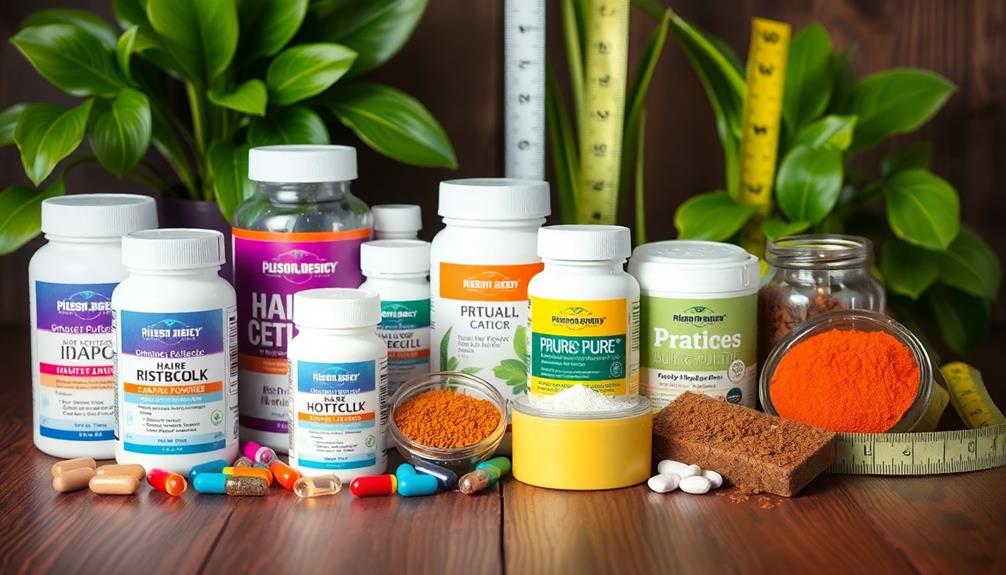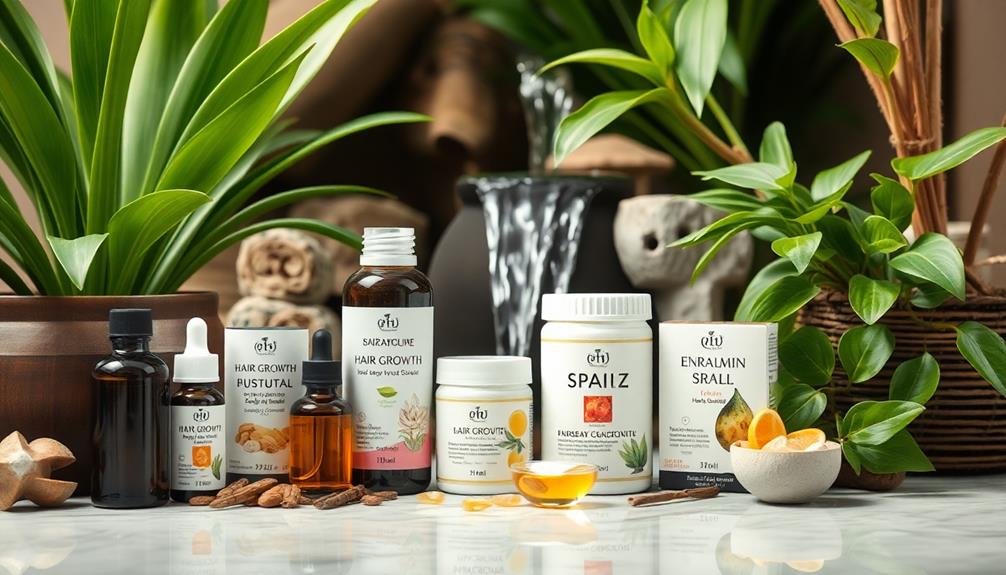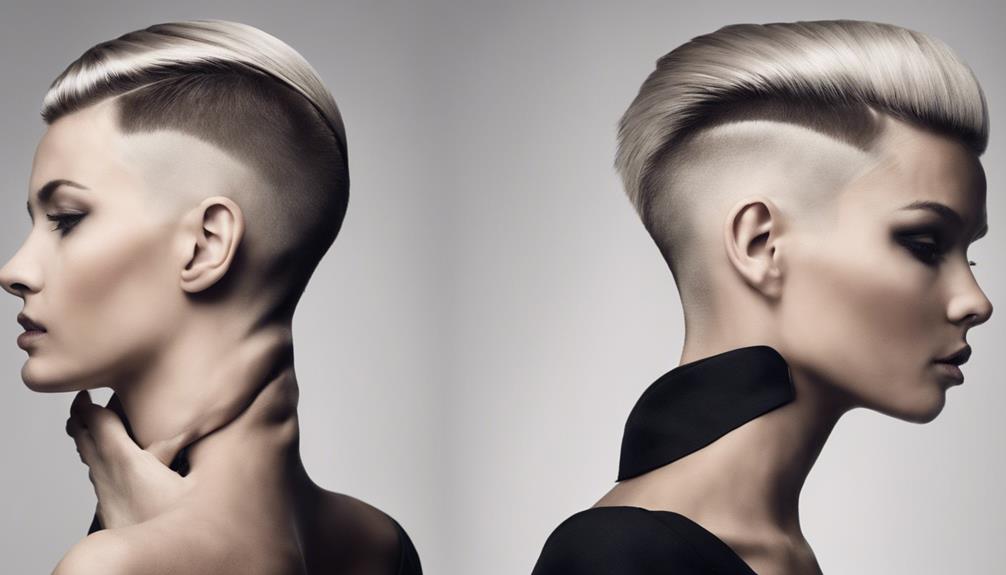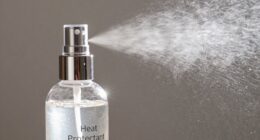Hair growth supplements are popular, but the science behind them is often scarce. While ingredients like biotin and vitamin D show some promise, many supplements lack strong evidence proving their effectiveness. Established treatments like minoxidil are more reliable for hair loss. Plus, the supplement market is loosely regulated, raising concerns about purity and safety. Overdosing on vitamins can lead to adverse effects, so it's essential to consult with a healthcare professional before trying these products. If you're curious about which alternatives might work better for your hair, you might want to explore other options available.
Key Takeaways
- Hair growth supplements are popular but lack substantial scientific evidence supporting their effectiveness compared to established treatments like minoxidil.
- Key ingredients like biotin and zinc may benefit those with deficiencies, but results can vary among individuals.
- Herbal extracts, such as saw palmetto and ginseng, show potential but require more rigorous research for conclusive evidence.
- The supplement industry is loosely regulated, raising concerns about ingredient quality, safety, and potential interactions with medications.
- Alternative treatments like PRP therapy and essential oils can be effective options for hair loss that may offer more reliable results than supplements.
Overview of Hair Growth Supplements

In recent years, hair growth supplements have surged in popularity as more people seek solutions for thinning hair and hair loss. Brands like Nutrafol and Viviscal claim to enhance hair thickness and health through a unique blend of ingredients, including biotin supplements, vitamins A, C, D, and various plant extracts.
With the hair growth supplement market projected to reach $5.4 billion by 2026, it's clear that many are enthusiastic to address their hair loss concerns. Additionally, just as proper oral hygiene is essential for overall health, maintaining a balanced diet can also considerably impact hair quality and growth importance of nutrition.
These dietary supplements often promote user testimonials on social media, showcasing positive experiences. However, while some ingredients like biotin and zinc are known to play fundamental roles in hair health—such as keratin production and tissue growth—the scientific evidence supporting the effectiveness of these supplements remains limited and inconclusive.
Despite reports of anecdotal successes, many hair growth supplements lack rigorous peer-reviewed studies to validate their claims. This raises questions about their efficacy compared to prescription treatments.
As you consider your options, it's essential to weigh the benefits and potential limitations of these popular solutions for thinning hair.
Scientific Evidence and Effectiveness

When considering hair growth supplements, you'll find that rigorous peer-reviewed studies are limited.
The variability in ingredient efficacy raises questions about what really works. It's essential to look beyond marketing claims and evaluate the scientific backing behind these products.
For instance, some ingredients may offer benefits for overall hair health, similar to how eye patches designed to hydrate and reduce puffiness can improve skin appearance.
Limited Peer-Reviewed Studies
Often, people turn to hair growth supplements in hopes of revitalizing their locks, but the scientific backing for these products is surprisingly limited. Many claims stem from limited peer-reviewed studies, often funded by the supplement companies themselves, raising concerns about bias.
For instance, while a 2021 trial suggested Nutrafol users experienced more hair growth than a placebo group, overall evidence remains inconclusive. Additionally, just as certain diets can impact overall health and wellbeing, understanding the nutritional balance of one's diet can also play a role in hair health, as seen with juice diets and nutrient deficiencies.
Consider these points:
- Most popular hair growth supplements lack robust scientific support.
- Some studies show biotin may help with hair health, but its role in preventing hair thinning is still unclear.
- The FDA's loose regulations on supplements lead to uncertainty regarding their safety and effectiveness.
In your quest for fuller hair, it's important to be cautious. While biotin deficiency can contribute to hair issues, simply taking supplements may not be a reliable solution.
Instead, you might want to explore more established treatments like minoxidil, which have more substantial evidence backing their effectiveness. Always consult with a healthcare professional before starting any new supplement to guarantee it aligns with your specific needs.
Ingredient Efficacy Variability
While limited peer-reviewed studies raise doubts about the reliability of hair growth supplements, the variability in ingredient efficacy adds another layer of complexity to the discussion. Biotin, often touted for its role in keratin production, shows promise for hair health. However, high doses may not lead to faster hair growth unless you have a deficiency.
Other ingredients, like saw palmetto, have shown mixed results in clinical studies. While some research suggests it might block DHT, the evidence for overall effectiveness in promoting hair growth remains inconclusive. A meta-analysis reinforces this uncertainty, highlighting that prescription treatments like minoxidil often yield more reliable results.
Given the FDA's lax regulations on supplements, ingredient efficacy can vary dramatically. To help you navigate this landscape, here's a quick reference table:
| Ingredient | Efficacy Evidence | Notes |
|---|---|---|
| Biotin | Limited for hair growth | Best for those with a deficiency |
| Saw Palmetto | Mixed results | Potential DHT blocker |
| Minoxidil | Strong clinical support | Prescription necessary |
| Vitamins (B, D) | Some anecdotal support | Requires more research |
| Collagen | Limited evidence | Popular but unproven |
Before starting any supplement, it's essential to consult healthcare professionals.
Key Ingredients and Their Benefits

When it comes to hair growth supplements, understanding key ingredients is important for making informed choices.
Essential nutrients like biotin and zinc are fundamental for hair strength and repair, while herbal extracts such as saw palmetto target hormonal influences on hair loss.
Additionally, amino acids like collagen support the structure and elasticity of your hair, making them essential for overall hair health.
Incorporating essential oils for aromatherapy can also enhance the effectiveness of these supplements by promoting relaxation and reducing stress, which are both beneficial for healthy hair growth.
Essential Nutrients for Growth
Essential nutrients play an essential role in promoting healthy hair growth, and knowing which ingredients to look for can make a significant difference in your hair care routine. Incorporating specific vitamins and minerals can enhance your hair's well-being and strength.
Additionally, just as hydrocolloid patches help draw out impurities for clearer skin, certain nutrients can also work to nourish and rejuvenate hair from the inside out. effective blemish treatment can be an important part of an overall wellness approach.
- Biotin: This vitamin is essential for keratin production. A daily intake of 30 µg is recommended, as a deficiency can lead to hair thinning and loss.
- Vitamin D: Important for hair follicle cycling, maintaining adequate levels of vitamin D can help prevent hair loss. Its deficiency is often linked to increased shedding.
- Zinc: This mineral supports hair tissue growth and repair. A lack of zinc can lead to increased hair shedding, making it essential for overall hair maintenance.
Additionally, don't overlook the benefits of collagen, which provides the amino acids necessary for your hair's structure and elasticity.
Herbal Extracts Overview
Herbal extracts are gaining attention for their potential benefits in promoting hair growth and overall scalp health. Many of these natural ingredients can stimulate hair growth, offering a holistic approach to hair retention.
For instance, saw palmetto is believed to block DHT, a hormone closely linked to hair loss, making it a popular choice for those looking to reduce hair loss naturally. Additionally, herbal alternatives like hibiscus and rosehip can enhance scalp health and elasticity, contributing to a more favorable environment for hair growth, as seen in natural alternatives to synthetic botox.
Curcumin, derived from turmeric, boasts anti-inflammatory properties that may support scalp health and alleviate inflammation around hair follicles. This can create a healthier environment for hair to grow.
Additionally, ashwagandha, an adaptogen, helps manage stress-related hair loss by regulating cortisol levels, which can negatively impact hair growth.
Green tea extract is another powerful herbal extract, rich in antioxidants like catechins, which combat oxidative stress and may promote hair growth while reducing hair loss.
Finally, ginseng is known for its ability to stimulate hair follicles and enhance blood circulation to the scalp, potentially increasing both hair growth and thickness.
Incorporating these herbal extracts into your routine could be a beneficial step toward achieving healthier, fuller hair.
Impact of Amino Acids
Amino acids play an essential role in maintaining healthy hair, as they're the building blocks of proteins like keratin, which is important for hair structure and strength.
By incorporating amino acids into your hair growth supplements, you can considerably enhance your hair's health and resilience. Additionally, some amino acids can aid in the absorption of other crucial nutrients, much like how best root lifters for fine hair provide targeted support for volume and thickness.
Here are some key benefits of amino acids for hair:
- Keratin Production: Amino acids support the body's natural production of keratin, which improves hair texture and resilience.
- Antioxidant Properties: Cysteine and methionine help protect hair follicles from oxidative stress, potentially reducing hair loss.
- Nutrient Absorption: Amino acids in supplements enhance nutrient absorption and utilization, promoting overall hair growth and thickness.
Cost and Consumer Trends

The hair growth supplement market is booming, with projections estimating it will reach $5.4 billion by 2026. This surge is largely driven by rising consumer interest in tackling hair loss issues.
To effectively manage your finances while exploring these options, it's wise to establish clear savings goals that account for potential expenses. However, the cost of these supplements, like Nutrafol, which requires four capsules daily at nearly $90 per month, may deter some potential users.
With competition heating up, you'll find a variety of brands offering different price points. This prompts many to explore cheaper alternatives or natural remedies.
Social media influencers and celebrity endorsements also play a significant role in shaping consumer trends, leading to nearly doubled usage of hair, skin, and nail supplements in recent years.
Yet, consumer skepticism about the effectiveness of hair growth supplements persists. You may find a growing demand for transparency regarding ingredient sourcing and effectiveness backed by scientific evidence.
As you navigate this market, keep in mind that not all products deliver the promised results. Evaluating both cost and quality will help you make informed decisions about which hair growth supplements are worth your investment.
Risks and Safety Considerations

When considering hair growth supplements, it's important to be aware of potential risks and safety concerns. Many supplements contain high doses of vitamins and minerals, which can lead to side effects. For instance, excessive Vitamin A can cause toxicity, while too much biotin may interfere with lab test results, leading to misdiagnosis.
Additionally, some supplements may interact with medications or exacerbate existing health conditions, highlighting the need for caution. Understanding potential side effects of various cold medications can provide further insight into how supplements may impact overall health.
Here are some key safety considerations to keep in mind:
- High doses of certain vitamins can cause digestive issues and hormonal imbalances.
- The supplement industry lacks regulation, raising concerns about the quality and purity of ingredients.
- Always consult with a healthcare professional to verify appropriate use and mitigate risks.
Alternative Treatments for Hair Loss

Many people exploring options for hair growth find themselves considering alternative treatments alongside supplements. If you're dealing with thinning hair, particularly conditions like male pattern baldness or alopecia areata, these alternatives might be worth a look.
Incorporating essential oils, such as rosemary oil for its ability to stimulate blood circulation, can also be beneficial in promoting hair growth. Platelet-rich plasma (PRP) therapy has gained traction for its effectiveness in treating androgenetic alopecia. While it requires ongoing treatments for sustained results, many find it a valuable option.
Low-level laser therapy (LLLT) devices, such as combs and caps, claim to stimulate hair growth, but the research is still inconclusive on their effectiveness.
If you're seeking a non-surgical solution, scalp micropigmentation can create the illusion of fuller hair by tattooing pigment onto your scalp. Additionally, taking care of your existing hair is essential. Avoiding excessive heat and chemical treatments can prevent further damage, while monthly deep conditioning treatments and scalp massages may enhance moisture and blood circulation to hair follicles.
Incorporating these alternative treatments alongside supplements like Viviscal may offer a more thorough approach to managing hair loss. Just remember, results can vary, so it's best to consult with a professional to find what works for you.
Frequently Asked Questions
What Is the Truth About Hair Growth Supplements?
The truth about hair growth supplements is mixed. While some users report benefits, scientific evidence often lacks. You should consult healthcare professionals before starting any supplement, as potential side effects may outweigh unverified claims.
Are There Any Supplements That Actually Help With Hair Growth?
Imagine you're trying Nutrafol, and after a few months, you notice thicker hair. Some supplements may help, but results vary. Always consult your doctor before starting, since not all products work the same for everyone.
Are There Any Hair Growth Products That Actually Work?
Yes, some hair growth products actually work. Minoxidil's proven effectiveness stands out, while Viviscal Pro and Nutrafol show promising results too. Just make sure to consult with a dermatologist before starting any treatment.
Is There Anything Proven to Stimulate Hair Growth?
Imagine your hair as a garden; some treatments, like minoxidil and finasteride, can nourish growth. While supplements like Viviscal show promise, results vary. You've got options, but proven solutions remain limited.
Conclusion
In summary, while hair growth supplements can be tempting, it's important to approach them with caution. Studies show that nearly 50% of people using these supplements report minimal to no results after three months. Instead of relying solely on pills, consider exploring alternative treatments like topical solutions or lifestyle changes that might be more effective. Remember, what works for one person might not work for you, so it's vital to find a personalized approach to hair health.









